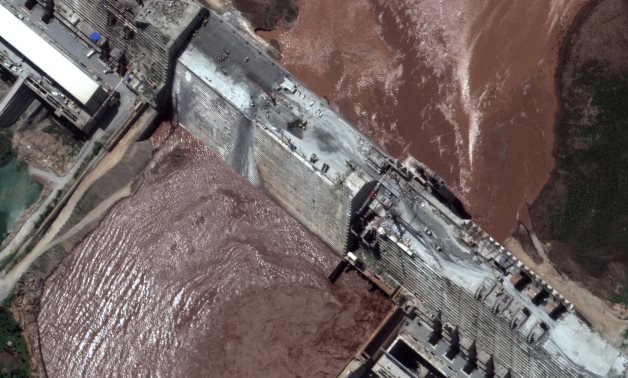
A handout satellite image shows a closeup view of the Grand Ethiopian Renaissance Dam (GERD) and the Blue Nile River in Ethiopia June 26, 2020. Satellite image ©2020 Maxar Technologies via REUTERS
CAIRO – 18 March 2021: Ethiopia has shown, through its latest statements on the rules of filling and operating the controversial Grand Ethiopian Renaissance Dam (GERD), its intention to impose a fait accompli on the Nile downstream countries (Egypt and Sudan), said Egyptian Foreign Ministry Spokesperson Ahmed Hafez in a statement on Thursday.
On the occasion of the 10th anniversary of the inauguration of the GERD in a symposium in Addis Ababa on Wednesday, the Ethiopian Minister of Foreign Affairs that his country is proceeding with the second phase of filing the controversial dam’s reservoir due in July 2021 although the three countries did not reach a legal and binding agreement on the dam operation and filling the dam.
“Completing the flagship project is a matter of assuring the sovereignty of the country,” said Deputy Prime Minister and Foreign Minister, H.E. Demeke Mekonnen during the symposium.
"Egypt voiced its rejection of the Ethiopian statements because of the threat it poses to the interests of the Egyptian and Sudanese peoples and the impact of such unilateral measures on security and stability in the region," Hafez said.
“Ethiopian officials use the language of sovereignty in their talks about exploiting the resources of a cross-border river,” Hafez said, adding “it is impermissible to extend sovereignty over them [cross border rivers] or seek to monopolize them.”
The natural resources should be fairly shared on the basis of the rules of international law, without causing harm to any party, he added.
The Ethiopian statements reflect the absence of political desire in negotiation in time during which the Democratic Republic of the Congo, the current leader of the African Union, is making appreciable efforts to relaunch the path of negotiations and reach an agreement before the next season of the flood.
“Egypt and Sudan emphasized the importance of an active involvement of the international community in negotiations led and conducted by the Democratic Republic of the Congo through an international quartet that includes the United States, the European Union and the United Nations, in order to ensure the effectiveness of the negotiation process and to push the three countries and help them reach an agreement on the Renaissance Dam in the coming months,” he said.
However, Ethiopia’s Foreign Ministry said two days ago that they haven’t received an official proposal to form a quartet committee that includes the European Union, the United Nations, the United States and the African Union to mediate the talks.
Ethiopia’s Foreign Ministry also informed Congo delegation earlier this week that they ‘reject the quartet mediation proposal’ and that other parties cannot be involved in the Renaissance Dam negotiations.
Egypt and Sudan have voiced their concern about the possible harms and threats of the GERD and how the dam will negatively after their water share of the Nile in case Ethiopia abstained from signing a binding and legal agreement on the dam operation and filling its reservoir.
Early March, 2021, Egypt’s President Abdel Fattah El-Sisi made a one-day visit to Sudan, during which he and the Sudanese leaders have affirmed rejection to Ethiopia’s unilateral plans to implement the second phase of the GERD filling whether or not an agreement among the three countries is reached.
Ethiopia has frequently affirmed it would implement the second filling of the dam next July under any circumstances.
Egyptian Minister of Water Resources and Irrigation Mohamed Abdel-Atti has said previously hat Sudan worried because of what happened last year when Ethiopia began filling the dam reservoir without notifying Sudan, adding that Sudan was negatively affected.
In mid-July 2020, Ethiopian authorities unilaterally carried out the first phase of the filling process with 4.9 billion cubic meters; and it is expected that the second phase of the filling would reach 13 billion cubic meters in July.
The dispute among Egypt, Sudan, and Ethiopia dates back to May 2011 when Ethiopia started building the dam; Egypt voiced concern over its water share [55.5 billion cubic meters].
As Democratic Congo is chairing the AU for the year 2021, it is attempting to revive stalling negotiations between Egypt, Sudan, and Ethiopia. However, few hours before Sisi’s official visit to Sudan, Ethiopian Minister of Water, Irrigation and Energy Seleshi Bekele said on Thursday that his country is looking forward to a “win-win solution” for the Grand Ethiopian Renaissance Dam through trilateral negotiation.
Bekele’s remarks came after he hosted a delegation from the Democratic Republic of Congo to discuss the ongoing negotiations with Egypt and Sudan to reach a deal on GERD.
In 2015, the three countries signed the Declaration of Principles, per which the downstream countries should not be negatively affected by the construction of the dam.
In October 2019, Egypt blamed Addis Ababa for hindering a final agreement concerning a technical problem, calling for activating Article No. 10 of the Declaration of Principles, which stipulates that if the three countries could not find a solution to these disputes, they have to ask for mediation.
Washington had brokered tripartite negotiations among the three countries, in the presence of the President of the World Bank (WB) starting from November 6, 2019 until February 27 and 28, 2020.
During these rounds of talks, tangible outcomes were agreed on among the three parties concerning the rules and mechanism of operating the dam and the filling process of the reservoir during drought and prolonged drought; however, an agreement was not sealed.
Constructions in the Grand Renaissance Dam started on April 2, 2011 at a cost of $4.8 billion. The dam is located on the Blue Nile with a capacity of 74 billion cubic meters and is expected to generate up to 6,000 megawatts of power.
Comments
Leave a Comment